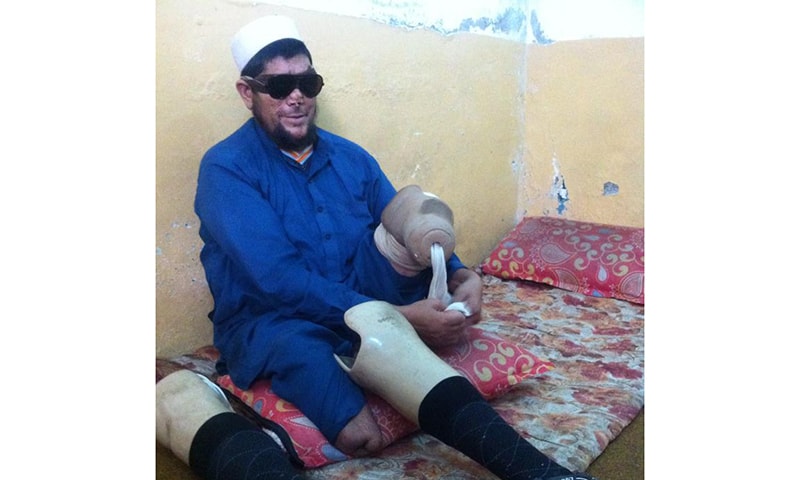PESHAWAR: Niaz Bahadar recalls the heartbreaking moment when his four-year-old daughter ─ his only child ─ discovered he was blind.
It was just a few days after the horrific explosion that had ripped off his limbs and permanently deprived him of vision.
"Baba, look at my bangles!" she had exclaimed, with the characteristic excitement of a young child who has returned from the village market bearing gifts.
"Please, tell me how they look? Do they look beautiful?"
Memories from that day overwhelm the 35-year-old, a former member of the Balochistan Frontier Corps, who lost both his eyes and legs 15 years ago when he stepped on a landmine during a routine patrol.
"I didn’t judge the area properly," he recalls, a tear trickling down his face. He had stepped on a mine that had been planted under the topsoil.
As we speak, Bahadar attaches an artificial leg to his knee, recalling the incident that changed his life.
Bahadar, who hails from Khyber Agency, is now a permanent resident of Peshawar where he lives in a rented three-room house near Karkhanu bazaar. He wears a blindfold to ward off the pity and sympathy that gushes from strangers when they look at his stressing wound.
"I don’t want others to feel sad by seeing my eye sockets without eyeballs," he says.

His career as a Frontier Corps official began in 1993. After the accident, he retired from service after nearly a decade spent working in it.
"I lost my legs and eyes, but not my courage and hope," he adds.
Life drastically changed for him. It was difficult to go back to everyday living; he was not born with this disability — he did not know how to go on.
A reason to live again
Despite the hurdles, Bahadar was determined not to be a burden for his family. He rallied people to establish a local humanitarian organisation which works for the rights of people with special needs.
In 2012, Bahadar created a non-governmental organisation called Niaz Disable Organisation (NDO) to provide support to people with disabilities in the region.
"I have seen people with different disabilities in my region become a burden on their families," Bahadar says. "My organisation strives to provide rehabilitation and sources of livelihood for these people."
The idea is to give disabled people a skill that empowers them to earn for themselves and their family. The organisation is looking to collect funds to establish a training centre. Meanwhile, an ambulance service providing transportation for disabled people who need to visit the hospital or attend to other urgent business has been launched.

NDO is currently gathering data of people with disabilities in the tribal region in order to issue special identity cards for them.
However, programme officer Nazir says there is no official data on Persons with Disabilities (PWDs) even though the government does issue disability certifiates. There are no systems in place for maintaining records, he added.
"We tried to get the data of PWDs of the Federally Administered Tribal Areas (Fata), but couldn’t find it," Nazir reveals, adding that NDO has almost completed its registration process. They provide logistical support to PWDs during their many rounds of office visits in the quest for their special ID cards.
There are more than 0.5 million PWDs in Khyber Pakhtunkhwa (KP) alone, Helping Hands for Relief and Development (HHRD) estimated in 2012. The HHRD report said more than five million people across Pakistan fall under the category of PWDs. However, no such data is available for PWDs in Pakistan’s tribal regions, Bahadar added.
The former FC member also said that a special ID card would allow PWDs to receive special privileges from both the public and private sector. His organisation's early days saw a project commissioned by the Fata Secretariat for the establishment of a skill centre for people with disabilities.
"We couldn’t give them the required number of people, as more than 95% of the disabled haven’t been provided with special ID cards," he says, adding that without the ID card, no one can claim disabled status.
Bahadar says the organisation was established in 2012, but is yet to receive financial support from the government.
"I started it by using my pension fund worth Rs300,000. How can we go ahead with large scale work without financial support?" he asks.
For three years, NDO has survived with the help of affluent individuals who donate generous amounts to charity. The organisation’s lack of funds is proving to be a hindrance to the execution of Bahadar’s plans to set up an education and skill centre for PWDs.
"The education and skill centre would be specifically for those disabled persons who are deprived of education due to financial problems," he says. "Women with disabilities would be encouraged to get special skills and education at the centre."
Kamran Shah is one of those who have benefited from Niaz’s tireless efforts to level the playing field for PWDs.
Shah, a 30-year-old disabled victim of the crippling polio virus, received a Bachelor’s degree from the University of Peshawar as a private candidate. Yet, he tells us he has been rejected from many government jobs as he does not have a special card to prove his disability.
NDO’s ambulance service ferried Shah to and from government offices until he finally obtained the requisite card.
"I have my own special card and have applied for a government job. I hope I will be selected, as I have submitted my application for the disabled quota," Shah says.













































